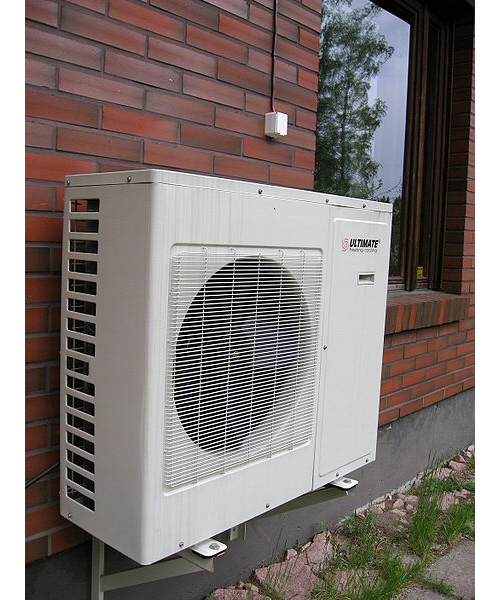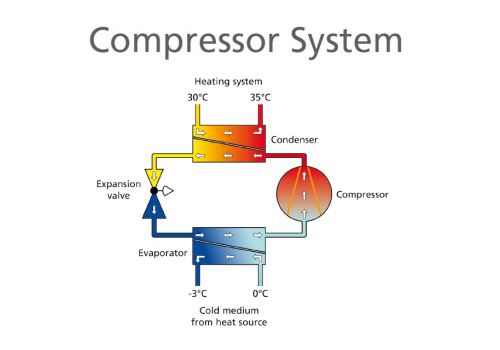Heat pumps provide efficient, reliable methods of heating homes and buildings. Because they use much lower amounts of fossil fuels, they also help reduce carbon dioxide emissions and other greenhouse gas emissions.
A heat pump draws heat from the ground, or from outdoor air, and transports it to another location for heating water or air. The supply of heat from the ground and air is plentiful, free, and constantly renewing. Even though they need electricity to operate, they produce about three to four times the power they use. The term coefficient of performance (COP) indicates the amount of heat produced for each unit of power used, and COP statistics can help you determine which system may be most beneficial for the domestic market.
Heat pumps are more efficient when used with underfloor heating systems in well-insulated, draught-free homes. They heat with lower temperatures and remain on for longer periods. When you touch them, radiators used with heat pumps do not feel as hot as those using gas or oil. Heat pumps require almost no maintenance and produce safe, clean heat.
Here’s how ground source heat pumps work:
- Installers fill a long loop of pipe with water and anti-freeze and bury it horizontally in a garden trench at least 1.5m deep. If the garden does not have sufficient space, they can bury the pipe vertically in a deep borehole.
- The water and anti-freeze mixture in the pipe absorbs heat from the ground, which is usually between eight and twelve degrees C and reasonably stable all through the year.
- The liquid passes through a heat pump powered by electricity, extracts the heat and returns to the underground loop.
- The heat pump uses mains electricity to raise heat from the ground to the heating system’s level and heats water in a buffer tank.
- The buffer tank provides heat for the heating system.
Air source heat pumps have a few slight differences. Installers use an evaporator coil to extract heat from air outside the home, and attach the unit to an outside wall of the building (as in the picture above).
Each system has its own unique qualities, and homeowners must decide which types of heat pumps would be more suitable for their particular circumstances.
Advantages of Ground Source Heat Pumps
- Since they do not have fans, they are quieter.
- The cost to run them is lower.
- It is usually easier to find a location for them because they are smaller.
- Their coefficient of performance is higher and constant.
Advantages of Air Source Heat Pumps
- Installation costs are lower.
- They can be located inside or outside the building.
- They do not need boreholes.
- Higher air temperatures gives them good coefficient of performance.
- Retrofitting is easier.
Disadvantages of Ground Source Heat Pumps
- Installation costs are higher.
- Installing boreholes can create disruptions.
- The horizontal ground loop requires a large area.
- It is essential to size the ground collector accurately due to the difficulty of redoing it.
Disadvantages of Air Source Heat Pumps
- They are noisier than ground source models.
- Their coefficient of performance is generally lower.
- They are larger.
Your contractor can analyse your location and requirements to give you valuable assistance in choosing the best heat pump for your specific situation.
Dane Cross writes on behalf of Ardenham Energy, a UK based provider of heat pumps and solar PV panels.
Image source: Wikimedia Commons



Kurt @ Money Counselor
Our home’s primary heating plant is an oil-fired boiler, which we are working to phase out, for cost and environmental reasons. We use mainly a modern, efficient wood-burning fireplace insert. I didn’t realize a heat pump would be an economically feasible option for our home since we have no ductwork, but an energy auditor told us about mini-split heat pumps, which don’t require ducts. We installed one in the lower level of our home (the insert is in the upper level), and we really like it. Surprisingly quiet, heats and cools, sophisticated controls, and we can add a second unit on the upper level if we want in the future. So if you don’t have ductwork, don’t give up on heat pumps!
Jeff McIntire-Strasburg
Thanks for bringing up ductless heat pumps, Kurt – we did a post on them last Fall: https://sustainablog.org/2011/09/ductless-heat-pump/